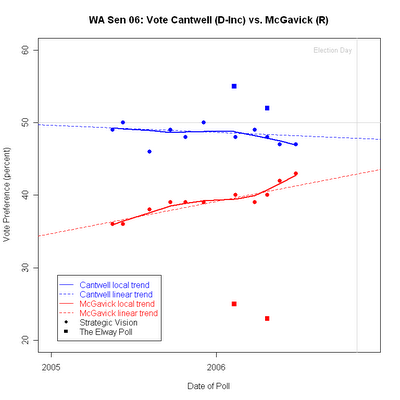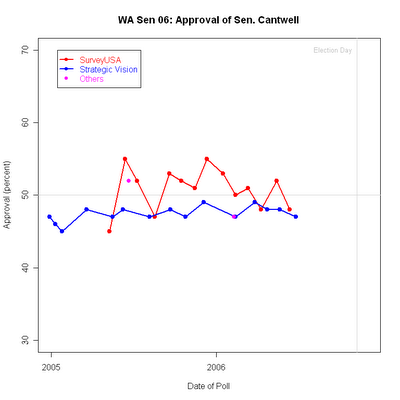
The Washington Senate race that looked stable until May now looks like it may be a close contest. Incumbent Maria Cantwell won in 2000 by a "comfortable" 2,229 votes out of 2.4 million cast, defeating incumbent Slade Gorton. Now Cantwell faces Gorton's ex-chief of staff and (more recently) Safeco insurance CEO Mike McGavick.
McGavick has climbed slowly through the 30s over the past year while Cantwell has held steady in the high 40s (but consistently below 50%.) The latest two polls taken by Strategic Vision show a notable upturn for McGavick and a smaller but still noticeable downturn for Cantwell. The key question is whether this is a real shift in the trend or just two slightly aberrant polls by a single polling firm. (See the Cook Report and The Fix for expert opinions.)
In the figure above, I fit a local trend to all the polls for each candidate (the solid lines.) I also fit a linear trend (dashed lines) to show a more conservative view of trends in the campaign. Both show some tightening, but the local fit shows a clear hint that the two trends are converging and will do so if the recent trend continues. In contrast, the linear trends suggests that the last two polls have diverged from the general trend. The linear trend suggests a close race but one with Cantwell expected to continue to lead.
From a pure polling perspective, it is a bit risky to put too much emphasis on just these last two polls. While they may signal a significant move in McGavick's campaign momentum, they could also be short term "noise" in the polling. We could be more confident if there were more polls available and from a variety of firms. Alas, Washington has produced few polls. The Elway Poll has reported only two surveys, and they stand out as unusually low readings for McGavick. (One must admit Elway could be right and Strategic Vision wrong, but then the pundits who see this as a close race must also be wrong.) The McGavick campaign is getting into full gear, so some upturn in response is not an unreasonable expectation.
Cantwell must also take some caution from remembering a similar situation six years ago, shown in the figure below. The challenger that year remained in the 30s throughout the summer of 2000, emerging into the 40s and real competition only late in the year. That challenger was Maria Cantwell. Then-incumbent Gorton appeared more vulnerable in June and July of 2000 than Cantwell does today. Gorton consistently polled in the low-to-mid 40s, as opposed to Cantwell's consistent high 40s, a comparative plus for Cantwell this year. Still, Cantwell's late surge demonstrates that challengers can and do move rapidly (especially when spending the kind of money Cantwell had in 2000.) Presumably McGavick will be similarly well funded this time.

Cantwell's job approval numbers have also been hovering around 50%, depending on who asks the question. (Mean approval=49.1%, inter quartile range=(47-51.5)) . SurveyUSA's 50 state tracking poll (using recorded interviewer voices and response by touch-tone, you have been warned!) finds approval generally above 50% but with a good bit of movement from month to month. Strategic Vision (with genuine live interviewers) finds approval consistently below 50%, but not by much. Neither series seems to show a clear trend, and if anything there has been a slight rise in Strategic Vision over the past 19 months. If we cut SurveyUSA in half, the last seven months have shown a decline while the first six showed a rise. Put them all together and there isn't much trend left. Cantwell does suffer a bit in comparison with Washington's other senator, Patty Murray, whose approval numbers have consistently been a bit higher (mean=54%, inter quartile range=(53-55)) than Cantwell's in both SurveyUSA and Strategic Vision polling.

There has been a good deal of discussion about Cantwell's record on the war and the potential for her refusal to call for a pull-out date to reduce turnout among lefty-Dems. Cantwell needs large margins in the Seattle area, something she accomplished against Gorton, who dominated the vote in less populous eastern Washington. McGavick's home is in Seattle, however, so he may win some moderate votes there that went to Cantwell last time. Judging from his web site, McGavick is trying hard not to appear too far to the right, while at the same time not reducing his vote among conservatives. It may be as hard for him to pull that off as for Cantwell to turn out enthusiastic lefty Dems. Both parties may suffer pains in their extremities.
Click here to go to Table of Contents